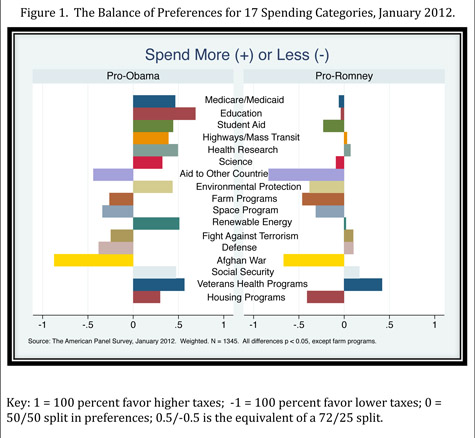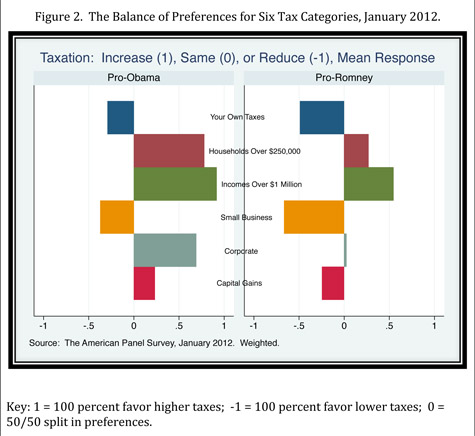The American public exhibits deep partisan divisions about the direction that federal fiscal policy should take, finds a new national survey from Washington University in St. Louis.
The American Panel Survey, which monthly polls the same group of 2,000 citizens, finds in its debut January survey that prospective voters for either Barack Obama or Mitt Romney differ widely in preferences for spending and taxes, although both groups favor increasing taxes on high-income households.
Respondents were asked whether spending or taxes in each of several categories should increase, stay the same or decrease. The results, illustrated in the following graphs, show a stark contrast between likely voters for Obama and Romney in a two-way race.
The first figure below shows how sharply polarized the two camps of panelists are across most domestic programs. With the exceptions of Social Security and veterans health programs, the balance of pro-Obama respondents favor more spending and the balance of pro-Romney respondents favor less spending.
On defense, the balance of pro-Obama respondents favor less spending and the balance of pro-Romney respondents favor more spending.
The second figure illustrates the differences between partisan groups in their positions on taxation. The balance of opinion in both camps supports tax increases for high-income households. The camps differ in their position on corporate and capital gains taxes.
The American Panel Survey (TAPS) is based on a national probability sample. It launched last fall and the January results are its first publicly released findings. As a panel, the survey returns to the same respondents each month, which allows for measuring change in attitudes among individuals over time and results in the accumulation of more data about the respondents than in most surveys.
The typical monthly survey includes about 1,600 respondents from a larger panel of 2,100.
TAPS is a project of the Weidenbaum Center on the Economy, Government, and Public Policy at Washington University in St. Louis. The survey is implemented by Knowledge Networks of Palo Alto, Calif.
For more information on the project or other data from this month’s survey, email Steven S. Smith, PhD, the Kate M. Gregg Distinguished Professor of Social Sciences and director of the Weidenbaum Center, at taps@wustl.edu.
More information about TAPS is available at taps.wustl.edu.

